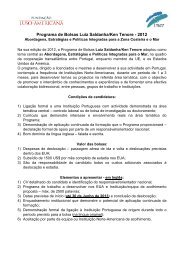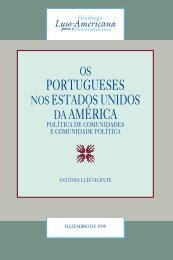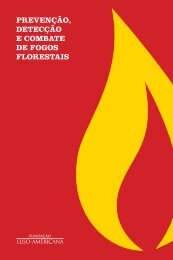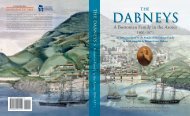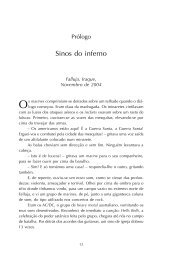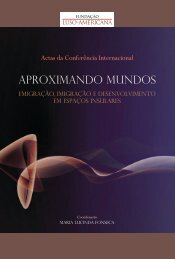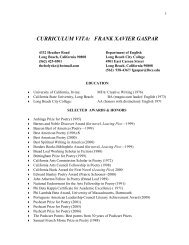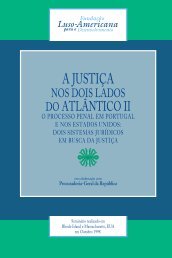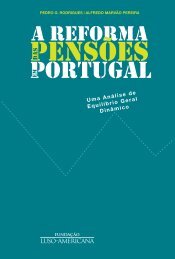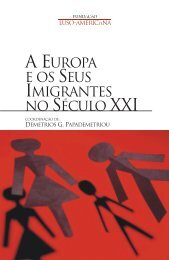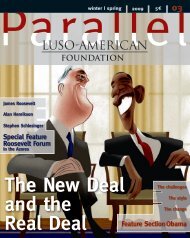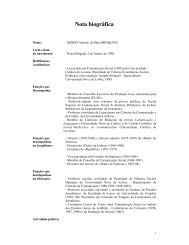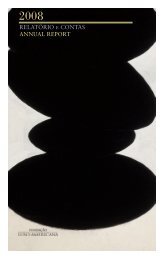A decade later - Fundação Luso-Americana
A decade later - Fundação Luso-Americana
A decade later - Fundação Luso-Americana
You also want an ePaper? Increase the reach of your titles
YUMPU automatically turns print PDFs into web optimized ePapers that Google loves.
RUI OChÔA<br />
Teixeira, professor of political science and<br />
international relations at the Universidade<br />
Nova de Lisboa and former Portuguese<br />
minister of the interior and defense, discussed<br />
the new strategic concept spearheaded<br />
by George W. Bush, the Global War<br />
on Terrorism, and its impact on US policy<br />
since 9/11, as well as the different government<br />
approaches to combating terrorism.<br />
They examined how today security is being<br />
perceived as a global phenomenon requiring<br />
well-coordinated measures, strategies,<br />
and policies among the world’s players.<br />
They also discussed the nature of today’s<br />
terrorism, whose main dissimilarity with<br />
terrorism of the traditional ilk is that it<br />
makes civilians its principle target.<br />
Mitchell Cohen analyzed the Global War<br />
on Terror, a new concept implemented by<br />
George W. Bush that consisted of combating<br />
“terrorist groups of global reach and<br />
their helpers.” However, he adds, “reality<br />
has a way of overwhelming definitions.”<br />
Nuno Severiano Teixeira mentioned that<br />
9/11<br />
A <strong>decade</strong> <strong>later</strong><br />
Lisbon’s Literary Guild was the venue for a series of talks on the 10 years that have ensued since 9/11. The main hall was filled to capacity<br />
with the general public and students from portuguese universities.<br />
9/11 had reinforced his perception that<br />
“security, or the nature of security had<br />
changed and was now absolutely global.”<br />
In his talk he gave special attention to the<br />
issue of security vs. freedom and the<br />
unavoidably conflictual relationship<br />
between the two concepts saying that,<br />
“transnational terrorism has raised issues<br />
between two fundamental values of democratic<br />
societies- – freedom and security<br />
(...) The way in which freedom relates to<br />
security has changed since 9/11 because,<br />
to guarantee our safety, which is a fundamental<br />
right of all citizens, to some extent<br />
we had to (...) make compromises, and<br />
rework some of the rights, guarantees, and<br />
freedoms that were also an integral part<br />
of our democratic society.”<br />
AFGHAnisTAn And irAq<br />
The third conference featured Carlos<br />
Gaspar from the Portuguese Institute for<br />
International Relations, General Loureiro<br />
dos Santos, and François Lafond from<br />
the German Marshall Fund. The thrust<br />
of the discussion was the present and<br />
future of Afghanistan and Iraq. The<br />
speakers focused on the important role<br />
the two countries play in international<br />
politics, as one of the most important<br />
items on the worldwide political agenda<br />
for achieving order and stability. They<br />
also explored changes that have occurred<br />
and their impact on the governance of<br />
the two countries. The speakers analyzed<br />
America’s justification for the military<br />
strategies it adopted, and for the invasion<br />
of Afghanistan and Iraq. François<br />
Lafond also discussed how difficult it<br />
was for democratic countries to develop<br />
and use democratic strategies in their<br />
attempts to halt terrorism.<br />
Carlos Gaspar stated that the United<br />
States “has focused on a somewhat secondary<br />
issue and been caught up in two<br />
peripheral wars – in Afghanistan and<br />
Iraq.” It has been “an atypical era in US<br />
Parallel no. 6 | FALL | WINTER 2011 15



